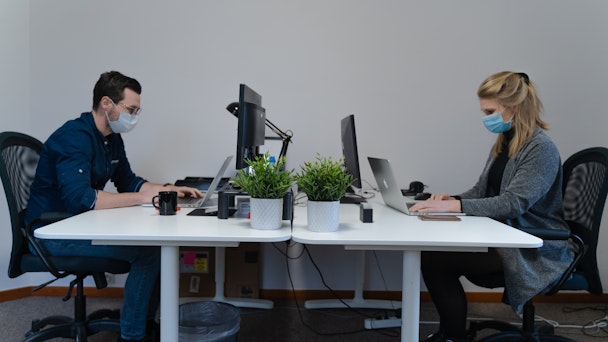Can we finally put ‘the new normal’ to bed? Agency leaders’ 2023 HR philosophies
Are we still in a ‘new normal’? Or back to the old normal? At a recent roundtable with agency leaders from The Drum Network, we asked how their approaches to talent have continued to shift.

Is the ‘new normal’ done – and what has replaced it? / Maxime via Unsplash
It’s three years now since the major destabilization that led to what some called the ‘new normal’: a renegotiation of our home and work lives, with commutes from one end of the room to another; kitchens turned into offices; and home offices into classrooms.
Since then, the old normal and the new normal have been vying for power. Some employers have ended up fully old-normal (a strict five days in the office); others have stayed firmly in the new (fully remote; full flexibility). Many more sit between the two, with a ‘hybrid’ arrangement (some days in the office, some from home; some, but not all, with some degree of flexibility).
Charting the full diversity of adland employers’ negotiation of this complex new territory is a task for another day, but here we bring you a sampler: seven leaders and employee experience chiefs, with their own agency’s current ruling and approach.
Advertisement
Emma Loizidis, head of people, Fox Agency: Fox, says Loizidis, offered flexibility pre-pandemic, and continues to now. She describes the policy as “fully remote, fully hybrid; you can choose where you want to work and what time you want to work”. Still, most do come to the office – Loizidis attributes this to providing an attractive working environment: “we moved all of our offices to brand new offices, to make a nicer space for people to come into.”
“Flexibility is normal now, whatever that looks like. All companies, in one way or another, will be offering this now. Perhaps we can put that to bed.”
Matt Kwiecinski, UK chief executive officer, Journey Further: “Maximum flexibility,” says Kwiecinski was a founding principle of Journey Further, pre-pandemic. “I don’t really care what hours that people work, or where they work from, and I never have, as long as they’re delivering the pre-agreed value back to our business and our clients’ business”.
“‘New normal’ is a stupid term. It’s people romantically looking in the rearview mirror, with a view about what the past was, and not accepting that the past had just as many challenges and opportunities as today.
“Two macro forces are impacting our businesses. One is heightened employee expectation, driven by Covid. People have awoken to macro forces that we as businesses should be doing something about: diversity, equity, equality, ESG and well-being. We should all give a damn and do something about it. The other is tech and AI empowerment, which also existed pre-Covid, but is far more prevalent now. If we’re not attuned to that, and modeling and running our businesses accordingly, then in this changed world in which we find ourselves, we’ll fail.”
Advertisement
Rhonda Hiatt, chief strategy officer, Clear, part of M&C Saatchi: Hiatt says that Clear has a clear hybrid policy: three office days and two remote days per week. “We have a lot of people who really enjoy getting together, so it hasn’t been a deal breaker for many, and we do have a couple of people that are more remote. So it’s not a hard and fast policy”.
“I’m not sure that ‘normal’ ever existed. If I look back over 20 years, every two or three years, there’s some significant change (though maybe not to the scale of impact of the pandemic). The big difference now is the collision of multiple macro forces, coming to this moment of convergence that is driving the way that we’re behaving and adapting to the world.
“For me, it’s about keeping my eyes open, making sure that we’re anticipating and recognizing those changes, and moving on them. When we look back 20 years from now, it’ll feel like there was a change in the era, with things that are no longer acceptable that people were doing for a long time; systemic problems that have been broken down. That’s probably more what this moment in time will look like. I’m hopeful that we look back and say that we did start making the changes.”
Suggested newsletters for you
Laurent Olver, head of marketing, GreenJinn: GreenJinn too has “always been pretty flexible,” says Olver – although employees “try to come in on the same day for that office feeling”.
“It’s all about adaptability, flexibility, and trust. I think a lot of companies talk about being flexible, but if the trust isn’t there, then the flexibility isn’t there. Hopefully, that will grow and stay.”
Mako Toure, operations and people assistant, Cyber-Duck: Cyber-Duck operates a hybrid model at HQ, with fully remote hubs outside its UK base. It’s important, says Toure, to respond to the “different demands” of individuals – “people with family expectations, or people like myself: I’m fasting at the moment, so it’s been nice to work two days from home”.
“Flexible working has really opened businesses’ eyes to mental well-being and the impact that Covid had on people’s mental health. I used to work in a retail store: an ‘essential’ business during Covid; the things that I witnessed were terrible, and I didn’t feel like the company look after my mental health and well-being. We need occupational health for employees that may be suffering (including when working remotely). Companies have to take those interests to heart.”
Georgia Bradley, senior vice-president of strategy, Merkle: Merkle, says Bradley, has “gone through quite a lot of change” in recent years, alighting on a hybrid policy where “it’s not mandated but encouraged for people to come into the office while giving that flexibility… it’s never going back to five days a week; it’s about finding that balance”.
“What is normal? We’re at a pivotal moment, where there are big forces creating significant change, but it’s not going to stop. If anything, the technology is just going to accelerate change in businesses.
“It’s about recognizing the importance of employee expectations: yes, they are accelerating. But the other big trend is the importance and value people are placing on organizational purpose and mission – and diversity, equity, inclusion, and sustainability. For organizations to succeed they have to understand who they are, what their mission is, and their purpose, and then create the right environment for people to feel empowered to do the best jobs that they can, in whatever form that might take.
“We talk about ‘hybrid’, ‘remote’ and ‘flexibility’. All of those are just tactics we can use to give people the best environment to be the best they can be.”
Lauren Coe, employee experience strategy director, Zone/Cognizant: Zone was acquired by Cognizant back in 2017, over the last few years have seen the smaller shop into a larger organization “with a slightly more proscribed policy,” says Coe. Still, that prescription is for “at least one day a week, hopefully, two or three” in the office.
“The biggest risk is to say ‘we’ve surveyed everyone; they've said this to put in this policy; so this is the way it is’. Flexibility and continuous change are all about embedding continuous listening, measuring what works (and what doesn’t work), being flexible, and understanding the differences that people have in their ways of working. Everyone, individually, is still working this out themselves. We can empower that and continuously evolve with employees rather than doing things to them through policies.”
Content created with:

Fox Agency
Fox Agency is an award-winning integrated B2B marketing and PR agency for the world’s most innovative tech brands.
We solve business challenges with smart...

Journey Further
Journey Further is a performance brand agency based in Leeds, Manchester, London and New York.
Designed to deliver Clarity at Speed for the world’s leading...

M&C Saatchi Group
We are a creative company with five specialist Divisions, connected through data, technology and culture, to deliver Meaningful Change for clients.
Find out more
GreenJinn
GreenJinn is a triple-digit growth UK platform for connecting great consumable brands with relevant consumers. Through our platform we work with some of the most...
Find out more
Cyber-Duck
Established in 2005, Cyber-Duck is a leading digital agency that works with exciting startups and global brands such as Cancer Research Technology, The European...
Find out more
Merkle
Merkle is a leading data-driven customer experience management (CXM) company that specializes in the delivery of unique, personalized customer experiences across...
Find out more
Zone
Zone is the customer experience agency inside Cognizant. We generate value for businesses by creating transformative customer experiences.
Zone does this...

